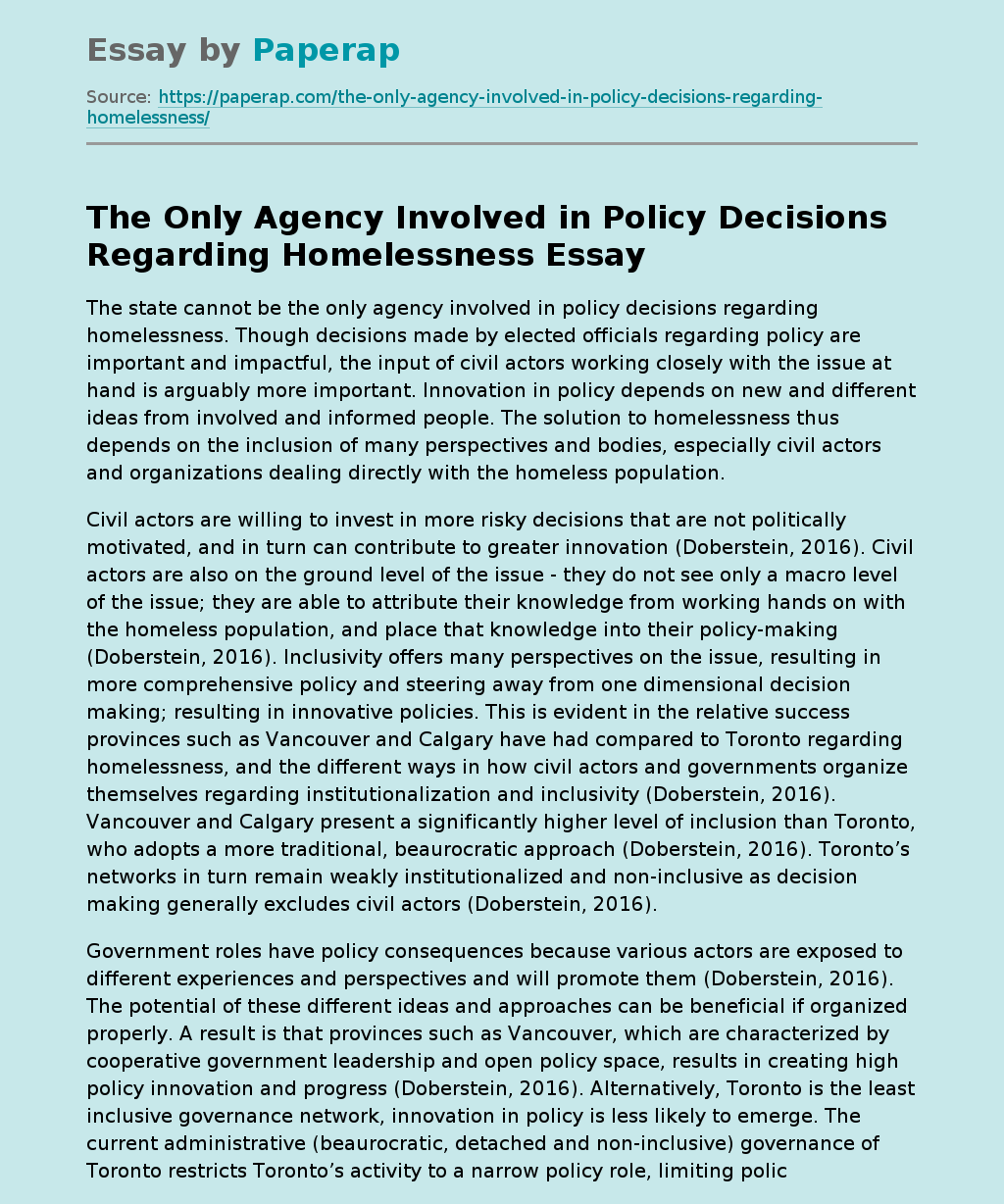The Only Agency Involved in Policy Decisions Regarding Homelessness
The state cannot be the only agency involved in policy decisions regarding homelessness. Though decisions made by elected officials regarding policy are important and impactful, the input of civil actors working closely with the issue at hand is arguably more important. Innovation in policy depends on new and different ideas from involved and informed people. The solution to homelessness thus depends on the inclusion of many perspectives and bodies, especially civil actors and organizations dealing directly with the homeless population.
Civil actors are willing to invest in more risky decisions that are not politically motivated, and in turn can contribute to greater innovation (Doberstein, 2016).
Civil actors are also on the ground level of the issue – they do not see only a macro level of the issue; they are able to attribute their knowledge from working hands on with the homeless population, and place that knowledge into their policy-making (Doberstein, 2016). Inclusivity offers many perspectives on the issue, resulting in more comprehensive policy and steering away from one dimensional decision making; resulting in innovative policies.
This is evident in the relative success provinces such as Vancouver and Calgary have had compared to Toronto regarding homelessness, and the different ways in how civil actors and governments organize themselves regarding institutionalization and inclusivity (Doberstein, 2016). Vancouver and Calgary present a significantly higher level of inclusion than Toronto, who adopts a more traditional, beaurocratic approach (Doberstein, 2016). Toronto’s networks in turn remain weakly institutionalized and non-inclusive as decision making generally excludes civil actors (Doberstein, 2016).
Government roles have policy consequences because various actors are exposed to different experiences and perspectives and will promote them (Doberstein, 2016).
The potential of these different ideas and approaches can be beneficial if organized properly. A result is that provinces such as Vancouver, which are characterized by cooperative government leadership and open policy space, results in creating high policy innovation and progress (Doberstein, 2016). Alternatively, Toronto is the least inclusive governance network, innovation in policy is less likely to emerge. The current administrative (beaurocratic, detached and non-inclusive) governance of Toronto restricts Toronto’s activity to a narrow policy role, limiting policy innovation and coordination. Innovation in policy thus depends on the context of the existing governance; which can either provide guidance and frame-work without stifling the policy’s innovation, or put the actors and organizations seeking positive change in a straitjacket, denying them control or significant input (Doberstein, 2016). Thus, policy can either be inclusive and coordinated, promoting innovation and positive changes to the issue, or it can be stifled and one dimensional, depending on the governance context – such as the failure of the NHA to sufficiently alleviate the homeless problem due to a disinterested and anti-state interference government.
The 2014 Housing First Initiative imposed by Stephen Harper is a prime example of the inadequacies of homelessness policy due to a stifling governance and governor, a lack of system coordination and innovation, lack of institutionalization and inclusivity, and lack of brokerage and persuasion (Doberstein, 2016). The initiative, though well-meaning in theory, touches on only one small aspect of the homelessness issue – chronic homelessness. The majority of the homeless population do not fall in this category, including youth, those fleeing domestic violence, and other civilians who are temporarily jobless (Institute of Medicine US, 1988).
The most common critique from across the country was that the new rules were imposed by the federal government without any appreciation of or flexibility for local circumstances the initiative forces local governance networks to adopt this model, causing many successful models that do not adhere to the governments model to halt (Doberstein, 2016). “Homelessness exists not because the system is not working but because this is the way it works,” Peter Marcuse, a German American lawyer and professor of urban planning, states (Cullenberg et.al, 1994). Our current system ensures the control of the powerful beaurocratic government and stifles the influence of civil actors. While it is assumed that homelessness policy is simply poorly managed, it may also be a symptom of a greater disease – a lack of inclusion and collaboration, resulting in failures to improve homelessness in Canada. The often privileged or politically motivated positions of elected officials can lead to a severe detachment from the reality of what happens on the ground level of Canadian society, and thus are incapable of making the best decisions for those people, without a civil actor perspective.
The Only Agency Involved in Policy Decisions Regarding Homelessness. (2021, Feb 08). Retrieved from https://paperap.com/the-only-agency-involved-in-policy-decisions-regarding-homelessness/

